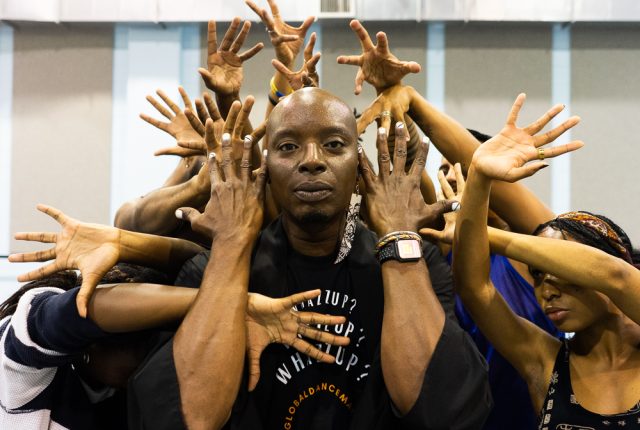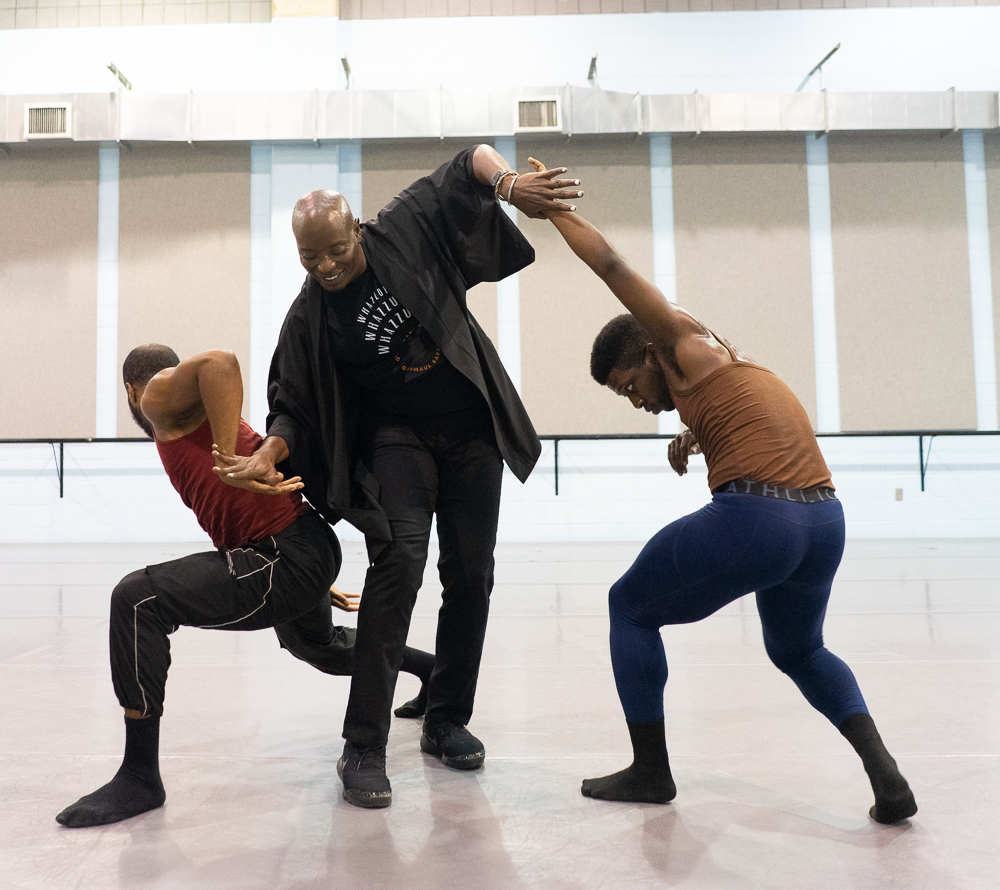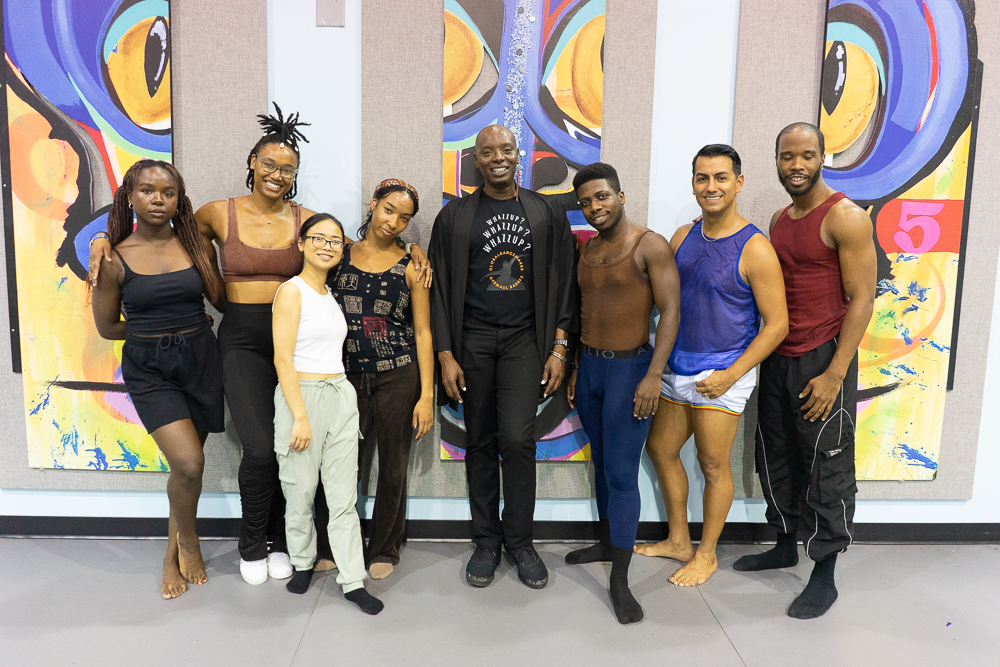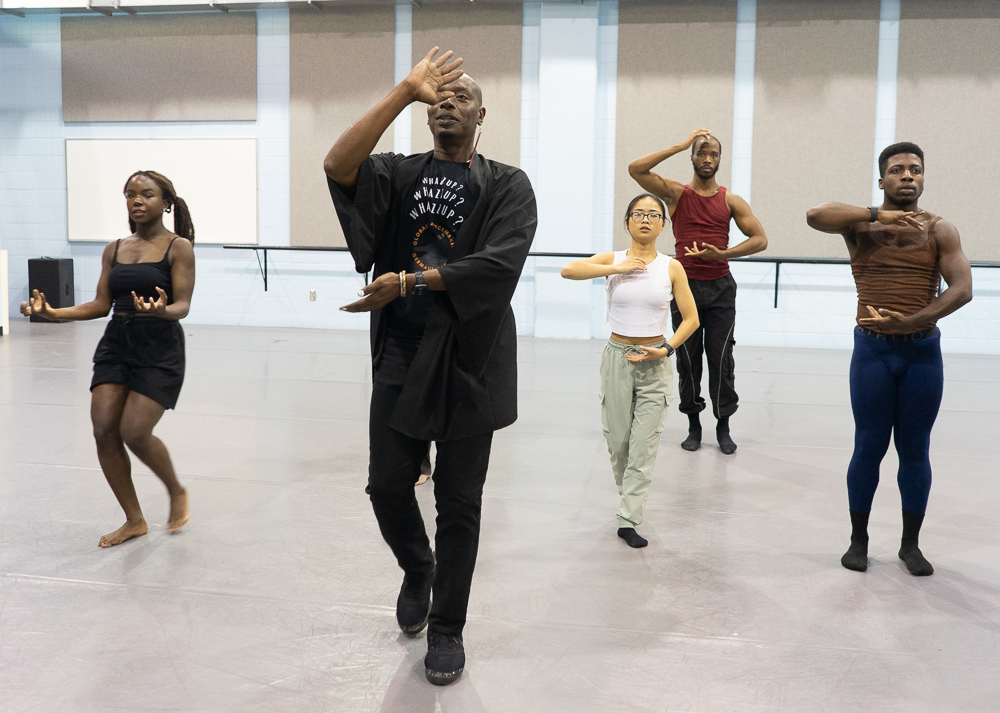
By Javacia Harris Bowser | For The Birmingham Times
Germaul Barnes describes himself as a “Global Dance Maker.”
An award-winning dancer and choreographer, Barnes’ work has been presented on stages around the world, in countries like Canada, England, and Poland. He’s danced in numerous cities, including Paris, France, and Tokyo, Japan.
But, since 2019, Barnes has proudly called Birmingham, Alabama, home. The Phoenix, Arizona, native who previously lived in New York for 24 years, came to The Magic City to teach dance at the Alabama School of Fine Arts (ASFA).
“There comes a time as a choreographer, as a dancer, when you sit to evaluate the longevity of a career and what is valuable,” Barnes said.
Reflecting on time he’d spent working with emerging dancers across the U.S. and around the world, Barnes knew he loved to teach.
“I really enjoyed passing on the information that was given to me, [though] sometimes I even still question, ‘Why me?’ I’ve been very fortunate to work with some of the legends of modern dance,” including icons like Katherine Dunham, Eleo Pomare, and Arthur Mitchell, he said.
Barnes, 53, has taught at Yale University, in New Haven, Connecticut; the University of Illinois Urbana-Champaign, in Champaign, Illinois; and Skidmore College, in Saratoga Springs, New York.

Nurturing In The Classroom And Beyond
“I love to see how I can help dancers become artists and be good people in society,” he said. “For me, teaching dance is just a gateway of how to help young people be great adults.”
And that is his goal at ASFA, which begins its fall semester on August 12.
The school, located downtown Birmingham, is a state-funded, tuition-free public school that provides an intensive education in the arts, math, and science to students from across Alabama.
After spending each morning in core academic classes that exceed state high school diploma standards, ASFA students devote their afternoons to honing their craft in one of six specialties: creative writing, dance, music, theater, visual arts, or math and science.
Students at the school consistently receive recognition in competitions in the arts and in academics at the state, regional, and national levels. Furthermore, in the past five years, 91 percent of ASFA’s graduating seniors have received merit scholarships for study at colleges, universities, and conservatories.
Barnes is only the second Black full-time dance instructor at ASFA in the school’s 53-year history. Mimi Twyman, who taught at ASFA from 1992 until her retirement in 2011, was the first Black dancer and choreographer to teach full-time at ASFA.
Twyman said of Barnes, “During the time I was teaching, I was exposing the students to other genres of dance that they were not accustomed to, and his ideas were an extension of what I was trying to do.”
But this is just one of the reasons Twyman believes ASFA students are lucky to have Barnes—or “Mr. Gee,” as the students call him—as a teacher.
“[Barnes] is a choreographer that allows students to be part of the process, which gives the students some ownership to the piece,” she said. “As an educator, he nurtures the students not just in class but beyond, guiding them to places outside Alabama, to conferences, workshops and performances to further expose them to the larger global world of dance.
“ASFA students are very fortunate to have him as an instructor. He offers so much to the department through his knowledge of dance and his experience as a professional dancer that has been there and done that,” she added.
Leaning into his “Global Dance Maker” moniker, Barnes strives to expose ASFA students to a wide variety of dance styles through his World Dance series. He’s brought in African dance instructors and choreographers and Afro Caribbean artists from countries like Barbados.
“It’s important to expose our students to a broad range of cultures and understanding and acceptance,” said Barnes. “That only helps them expand themselves as people.”
Students like Hannah French, who graduated from ASFA in May 2024 and plans to start studying dance at New York University in the fall, said Barnes not only expanded her dance knowledge but also imparted life wisdom.
“He has taught me [and] his other students valuable lessons not only in the studio but outside the studio, as well,” French said. “Mr. Gee has always been there for advice on navigating life and is a teacher that students feel comfortable going to when they need guidance. He is open, he is kind, he is inspiring, and he is a teacher who believes in his students and sees everyone’s potential. I am so grateful for all that Mr. Gee has poured into me and the wisdom he has imparted that will impact me for the rest of my life.”

“I Knew I Was Going To Be A Dancer”
Born and raised in Phoenix, Arizona, Barnes can’t remember a time in his life when he wasn’t dancing.
“My late mother would say I was dancing as a fetus,” Barnes shared with a laugh.
He still has fond memories of dancing in his family’s living room to songs by artists like Michael Jackson, The Jackson 5, Peaches & Herb, and Earth, Wind & Fire. He also loved the syndicated television series Solid Gold, a music show that featured the biggest artists of the moment.
Recognizing her son’s natural talent, Barnes’ mother, Sandra Sykes, who passed away in December 2018, sought out free dance programs at the local parks and recreation department. At the age of 7, Barnes enrolled in a dance class that taught him several dance styles, including jazz, tap, ballet, and even disco.
“And from that point on, I just knew that I was going to be a dancer,” he said.
Barnes, his youngest sister, Serena, and a friend from the neighborhood formed a group they called “The Little Bits.” The trio won all the community talent shows and were even featured on local TV.
“My mom would stay up for hours making our costumes,” Barnes recalled.
His mother was also active in local demonstrations meant to amplify the voices of Phoenix’s small Black community. Barnes still has a photo of himself and The Little Bits in a march for Juneteenth, the celebration of the end of slavery in the U.S.
Barnes went on to attend the Center of Performing Arts at South Mountain High School in Phoenix, a school like ASFA. He also studied with the Phoenix School of Ballet and Ballet Arizona before continuing his dance training at the University of the Arts, a private arts university in Philadelphia, Pennsylvania, which closed in June of this year.
The Seven-Year Interview
Acclaimed dancer, choreographer, and instructor Teri Weksler first brought Barnes to Birmingham to set a work for Southern DanceWorks, for which she served as artistic director from 1997 to 2021. When Weksler became a full-time instructor at ASFA, she invited Barnes to visit as a guest artist each year.
“That was seven years prior to getting the [full-time job at ASFA], so I said I had a seven-year interview,” Barnes said.
During those seven years, he learned that ASFA was a good fit.
“It’s a wonderful institution that supports teachers and encourages instructors to stay in the professional world because they see that it’s valuable to know what is out there and bring back the information to the students,” Barnes said of ASFA. “I found that most institutions might have that in their mission statements—that they want to encourage their instructors to continue being professionals—but they don’t actually do it. ASFA has it in the mission statement, and they’re about it.”

World Traveler, World renown
Whether at Alabama School of Fines Arts (ASFA) or halfway around the world, Barnes believes dancers are like anthropologists or archivists whose work should reflect the issues of the time. In his work, he unapologetically explores the challenges people of color face today. Yet, he also strives to infuse optimism and joy in his choreography.
“As a Black artist, I am interested in telling a narrative of the Black experience through a sense of pride, not ‘woe, me’ all the time,” Barnes said.
After decades of dancing with various companies, Barnes said he realized that he’d lost that joy he felt as a kid dancing in the living room to the sounds of Michael Jackson and the syndicated music television series Solid Gold, a music show that featured the biggest artists of the moment.
“The groove, the naturalness, was lost because I was so into these Eurocentric ideas of what a dancer was,” he said.
So, he went to the studio determined to fan the flames of the joy that he once found in dance. And he embeds this in his choreography and teaching techniques.
“In my technique, with different exercises and lots of conversation and self-evaluation, we ignite joy through the physical and mental space that allows dancers to retain a sense of exuberance for what they’re doing,” he said.
An Impressive Resume
In the early part of his professional career, Barnes performed with a host of companies. In 1995 he started dancing with Bill T. Jones/Arine Zand Dance Company, which he’s worked with for nearly 30 years. After retiring from dancing with the company in 2005, Barnes began restaging works of Jones. He’s currently working on a restaging for the University of Alabama, bringing Jones’ work to the state of Alabama for the first time.
Barnes serves as a choreographer adviser for One Dance-UK’s – Dance of the African Diaspora and Movement Research. He’s worked with dance companies in Russia and Spain, too.
He’s the curator of Contemporary Improvisation for Black Men, a program that uses dance to bring together Black men across generations.
Barnes also served as the choreographer for “Bob Marley: A Musical,” which premiered in 2015 at Center Stage in Baltimore, MD.
“That was the first commercial contract that I’d ever gotten so when they said to have your people contact my people, I had to go and find some,” Barnes said with a hearty laugh. “I was very excited. I love Bob Marley and I’ve always like connected with his message.”
Full Circle
Dance has afforded Barnes the pleasure of being “in every continent of the world except for Antarctica,” he said. “And this is a little boy from the projects of Arizona.”
Despite all his accomplishments, Barnes said the highlights of his dance life were dancing in a park in Arizona for his aunt’s 90th birthday in November of 2018 and performing at block parties in Brooklyn when he lived there.
Barnes may travel the world, but he still deeply cares about the places he calls home.
Coming full circle, Barnes is now artistic director of Southern DanceWorks, the company that first brought him to Birmingham. Barnes is striving to breathe new life into the 60-year-old company.
“I hope that Southern DanceWorks can help with a contemporary identity of not only Alabama, but of the South,” he said. “I’m hoping that this company is lending to that fabric of the new identity of Birmingham.”
Southern DanceWorks will present “Lurks Behind,” a new dance performance rooted in the rich history of Birmingham’s 99 neighborhoods, on Sunday, August 25 from 6:30 to 7:30 p.m. at the City Walk BHAM Amphitheater (Green Block, Behind the Birmingham Museum of Art).
The production explores topics such as food insecurity, home ownership, and community pride. “Lurks Behind” is a free public event. To learn more and to support Southern DanceWorks in their commitment to making dance accessible and relevant, visit southern-danceworks.com/support.
Full disclosure: Javacia Harris Bowser is a graduate of the Alabama School of Fine Arts and taught English at the school from 2009- 2019.




